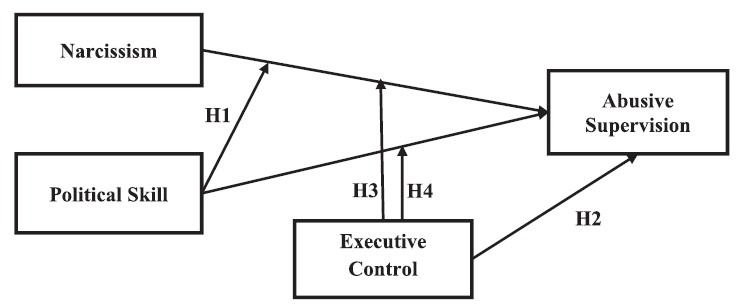Research links narcissism and abusive supervision

Early in my career I worked for an abusive manager. It was a small company with a start-up vibe – full of younger workers and an egotistical founder. Our office had two physical areas. We always knew when trouble was brewing. Workers from the danger zone near his office would start pouring into our safer area. No one wanted to be in his line of sight when the ranting started.
The yelling penetrated the walls. All work stopped. Everyone speculated about (and sometimes bet on) the cause of the latest upset. Employees worried that they were next in line for a yelling session.
Most days at that company were good and the work was interesting. But the whole environment changed when he lost his temper. That company never reached its full potential – partly due to an abusive leader.
Narcissism leads to abusive supervision

Conventional wisdom says that bad supervisors are the primary reason for employees to leave a job.
One type of a bad supervisor is a narcissist. In this post, we’ll cover research that shows the link between narcissism and abusive supervision.
Supervisor abuse can lead to turnover, poor performance, and at the very least, a miserable workplace. Fortunately there are some things that can help control abusive supervision. The impact of narcissism on the workplace can be lessened through politically skilled behaviors and self control.
Research Overview
In their 2018 article, “Psychological and Neurological predictors of abusive supervision” in Personnel Psychology, Waldman, Wang, Hannah, Owens and Balthazard shared their research looking at the impact of narcissism. They studied how the supervisor’s level of political skill and executive control influenced the abusive behavior. In this case, they defined abusive supervisors as ones who engage in hostile verbal and non-verbal behaviors (but not physical contact).
In a fascinating combination, they used both traditional psychological measurements (surveys by self and others) and some cutting edge neural-sensing assessments. By neural-sensing assessments, I mean that they actually hooked participants up to an EEG cap with 19 electrodes and measured and monitored actual brain activity. Pretty cool!
What is a narcissist?
Narcissism is one of those terms that gets thrown around frequently regarding unpleasant people. But not every unpleasant person is a narcissist. In psychology, narcissists are people who demand praise, attention and adulation from other people to bolster their own sense of self. When they don’t receive positive attention, they retaliate with passive-aggressive, hostile or cruel behaviors. You can understand why it would be horrible and unpredictable to work for a narcissist.
What is political skill?
The researchers wanted to understand how political skill might increase or decrease the likelihood of a narcissist being abusive. While narcissism is a personality trait, political skill is about behaviors that can be learned. A politically skilled leader understands other people at work and uses that knowledge to influence others to meet objectives.
Although “being political” often has a negative connotation, in this case, it is a strength. Political skills helps supervisors organize a team and get work done. Being politically skilled requires ability in related areas such as understanding people, feeling confident and maintaining self-control.
What are brain-based abilities such as executive control?

Along with political skill, the researchers studied executive control. In psychology, executive control is not about how much power a leader wields. Also called executive functioning, it refers to several neurologically-based (brain-based) abilities.
These brain-based abilities include inhibition, working memory and cognitive flexibility. Someone with high executive control controls emotions and behavior (inhibition), retains critical information in order to make sense of it (working memory) and can change perspectives (cognitive flexibility).
Since executive control is brain-based, there are physical brain structure differences between people that can cause different behavior. Don’t worry if your own executive control does not seem strong. Even brain-based abilities can usually be improved over time due to the plasticity of the human brain.
Research Findings
This research examined how narcissism and political skill would influence abusive supervision. Executive control was expected to moderate the relationships.
The study included 56 supervisors from military and business organizations. 83.6% of these participants were male an 86.3% were Caucasian. Much of the data was collected via survey from the target participants, and their peers and direct reports. The participants also engaged in an EEG, during which they were monitored through 19 electrodes attached to their scalps. The EEG data was used to assess connectivity in the prefrontal cortex which provides a measurement of executive control.
Figure 1 shows the model tested in the study.

Figure 1: Research model in Waldman et. al. (2018) article
Evaluating this model, the researchers found:
- Finding 1: Leaders, their teams and the organization benefit from leaders who demonstrate political skills. Higher political skill directly results in less abuse in the workplace.
- Finding 2: Political skills also help out when a supervisor has a natural tendency to be narcissistic. A narcissistic supervisor will be less abusive if the supervisor also has strong political skills. (H1)
- Finding 3: Supervisors with brain structures that support more executive control are less abusive. (H2) In addition, executive control helps control the relationship between political skill and abusive supervision.
The research did not support the idea that executive control would moderate the relationship between political skill and abusive supervision (H3).
Applying This Research

- Build political skills: This study shows the importance of good political skills. Political skills help create a more positive workplace and also can help minimize negative traits like narcissism. Since political skills can be learned, you can work on developing these skills in yourself or in your team. To develop political skills, focus on improving communication, reading body language, asking questions to understand different perspectives and learning how the work of your team contributes to the broader goals of the organization.
- Realize some things are hard to coach: If you are coaching someone else, realize that not every issue is coachable. This research indicates that you can teach political skills to minimize the impact of narcissism – but it might not always work. And some traits like executive control are brain-based, so they will be even harder to change. Someone who has reached adulthood and a supervisor role and still struggles with problems like poor impulse control might need more help than you can give at work. Be thoughtful about whether an abusive supervisor’s behavior and tendencies are coachable or not.
- Watch for narcissistic behavior: Stay on the look out for narcissistic behavior. Narcissists are focused on getting positive attention and adulation. When there is a conflict, they might choose the option that makes themselves look good versus doing what is right for the company. They also have a tendency to retaliate against people who don’t support and praise them. When the narcissist is a supervisor with responsibilities for people management and decision making, the negative fallout can be exponential and extreme.
- Don’t tolerate abusive behavior: Culture in an organization is defined more by what is tolerated than by what is intended. I’ve seen many organizations allow an abusive supervisor to stay in role – usually because that person has a special skill or long tenure. By tolerating that abusive supervisor, the organization creates a culture in which abuse is tolerated and the health and well being of employees is not valued. Is that the culture you want to create?
Narcissism, like too much charisma and the wrong amount of transformational leadership, can show up in the traits of ineffective and harmful supervisors. This study highlighted some important factors that can lead to abusive supervision.
By avoiding these traps, we can create great places to work that allow all associates to be both productive and happy.
Assessment of Research
This interesting study covered an important topic (abusive supervisors) and used an innovative measurement technique (neural sensing assessment). My background is in the traditional psychological measurement, so I don’t feel qualified to evaluate the neural sensing technique. But the study is published in a top tier journal, so that makes it credible (and fascinating) to me.
The sample size (n=56) was small and heavily skewed to white men. I suspect that the laboratory requirements for this type of research make it difficult to have a large sample size. However, I hope that future research includes more diversity.
Research Details
Waldman DA, Wang D, Hannah ST, Owens BP, Balthazard PA. Psychological and neurological predictors of abusive supervision. Personnel Psychology. 2018;71:399–421. https://doi.org/10.1111/peps.12262
Research factors: neural-sensing assessments, mediators, moderators, path analysis, integrative self-control theory (SCT), pre-frontal cortex (PFC), executive control theory
Researchers
- David A. Waldman, Arizona State University
- Danni Wang, Rutgers University
- Sean T. Hannah, Wake Forest University
- Bradley P. Owens, Brigham Young University
- Pierre A. Balthazard, California State University, Sacramento



